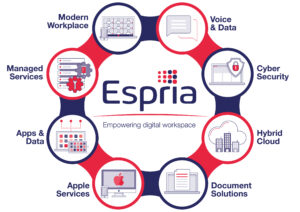All PSTN and ISDN networks will be closed by 2025, transitioning all UK businesses to all-VoIP networks to mitigate the rising costs of maintaining legacy equipment. According to managed services provider Espria, millions of UK businesses are expected to be impacted, especially those who still rely on fax machines and landlines.
Andy Fung, Solutions Architect, Espria, stated, “Businesses need to address this issue now and avoid sticking their heads in the sand. It is going to happen whether they are ready or not. Decision makers should not wait until 2025, as exchanges are being phased out now.”
BT Openreach announced back in November 2017 its intention to switch off analogue and ISDN lines in 2025, affecting PSTN-based services and some broadband services. BT Openreach’s logic was based on the fact that since ISDN’s (Integrated service digital network) first iteration in the 1990’s, digital demands on networks for organisations and homes have changed dramatically, and the underlying technology needs to reflect and support modern requirements.
A rapid audit of your network is recommended to understand how many connections you have, of what type and what they are being used for. Leaving it to the last minute could result in increased installation costs and delays. Depending on the nature of your organisation, these could be anything from simple voice lines to DSL broadband, building alarm circuits or even all external connectivity to the telephony system in use.

“Organisations can get prepared for the 2025 switch-off because BT Openreach is taking a phased stop sell approach at individual city locations taking place between December 2020 to August 2023. When a location has met its stop sell deadline, then analogue and ISDN lines cannot be purchased or have additional features or changes made to existing service,” continued Fung.
“If your organisation is using analogue phone lines, ISDN or broadband services running over analogue lines, at the end of December 2025 these will be switched off and become end of life.”
These include:
- Analogue phone lines (including dial up devices, fax, modem, and PDQ machines)
- ISDN (ISDN2 and ISND30)
- Some broadband services (ADSL, Max, 2+ and FTTC circuits)
“If you’re still in contract with a line that is coming to end of life, like ISDN and PSTN, you need to start looking at your current technology ecosystem and get prepared”, continued Fung.
Espria has recommended the following tips:
- If you’re renewing contracts, look to move to a future-proofed solution
- When you’re opening a new site location, consider IP based connectivity options
- Assess your existing telephony options, if you’re using an on-site PBX with analogue or digital inbound/outbound lines review the marketplace for suitable VoIP (Voice over Internet Protocol) options including IP telephony and Microsoft Teams.
“However, this also presents an opportunity for organisations to reassess their business communications as a whole. Implementing cloud phones as part of a wider unified communications plan allows an organisation to overhaul outdated communications infrastructure and save costs with comprehensive and targeted change.
“This is best completed and managed with the assistance of industry experts able to bring together phone lines, video calls, email, chat tools, file sharing and more. With the right assistance, you can improve your company’s communications, save money and seamlessly integrate all aspects of communications and connectivity,” concluded Fung.

